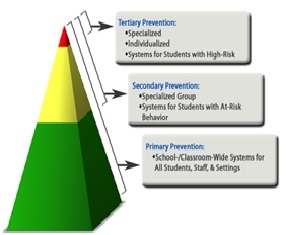What Is SWPBIS?
The School-wide Positive Behavior Interventions and Supports (SWPBIS) is in alignment with the Index of Inclusion (Booth & Ainscow, 2011) because it promotes the active participation of ALL students across a continuum of supports. Students with intensive learning needs would benefit the most by receiving multiple tiers of support in a regular classroom. Student progress is closely connected to data and monitoring of the integrity of implementation by school personnel. As Figure 1 shows, the first tier is primary (or universal) prevention and consists of implementing clearly articulated social expectations (e.g., be responsible, be safe, be respectful) in all classroom and non-classroom settings for all students. Everybody is involved (administration, teachers, students, parents). School expectations are 3 to 5 positively stated behaviors and are taught directly and explicitly across settings with multiple people. Rules for inappropriate behaviors are stated and a continuum of logical consequences is established. Frequent positive student feedback is delivered for meeting school-wide expectations. Data are collected on problem behaviors and implementation integrity. A school team of teachers and administration (a.k.a. PBIS team) reviews data regularly to make decisions.

Second tier is secondary (or targeted) prevention, designed for students who do not respond to the primary prevention. These students receive additional instructional support and continue to participate in the primary prevention of their classroom. Targeted interventions consider student strengths and needs as well as school/community resources available. Examples of evidence-based secondary strategies are think time, social skills groups, peer tutoring, check-in and check-out (see Horner et al., 2010 for description). Parents are more involved at this stage and data collection is more frequent to inform intervention effectiveness and make changes in intervention procedures.
Third tier is tertiary (or selected) prevention and it involves individualized support for those students who do not respond to previous tiers. A support plan is developed utilizing an ecological assessment known as functional behavioural assessment (Sugai & Horner, 1999) and multi-component strategies are included for teaching skills and minimizing inappropriate behaviours. Students participate in general classrooms and their progress is monitored frequently along with expertise assistance. Family collaborates closely with school to implement student support plan.
Research Evidence on SWPBIS
Empirical illustrative research on PBIS found that implementation of school-wide PBIS approach was associated with reduction in school behavioural problems (Taylor et al., 1997) and increases in student academic performance (Luiselli et al., 2005). Rigorous group randomized experiments strengthened those findings. Bradshaw et al. conducted a series of randomized group experimental studies with 37 elementary schools on school-wide PBIS over a 7-year period. They found that PBIS training produced high teacher implementation integrity performance (Bradshaw et al., 2008a), better organizational health and school climate (Bradshaw et al., 2008b, 2009), discipline referrals reduction and academic achievement increases (Bradshaw et al., 2010) in PBIS schools. Likewise, Horner et al. (2005) in their 3-year randomized wait-list design concluded that PBIS elementary schools evidenced improved outcomes in school safety and student academic achievement. Recently, Waasdorp et al. (2012) reported that students in PBIS schools had significantly reduced risk for bullying compared to students in non-PBIS schools.
Research effectiveness of PBIS is also documented across Europe. Researchers in Norway document significant school improvements for almost a decade when they examined the effectiveness of PALS ("Positive behaviour interactions and learning environment in school"), a cultural adaptation of the PBIS, in more than 153 elementary and secondary schools. They concluded that their culturally adapted PALS model produced significant school problem reductions and student social improvement (Ogden et al., 2012; Sørlie & Ogden, 2007). Likewise, researchers in the Netherlands adapted the PBIS model in Dutch schools. They found that classroom teachers in elementary and secondary schools implemented the PBIS's primary level with high integrity and evidenced positive student behavioural outcomes (Blonk et al., 2011; Goei et al., 2010/2011). Further, in a European funded consortium project titled EUROPBS, research evidence across 5 European partner schools demonstrated the PBIS's positive impact on school climate (Goei, 2012).

